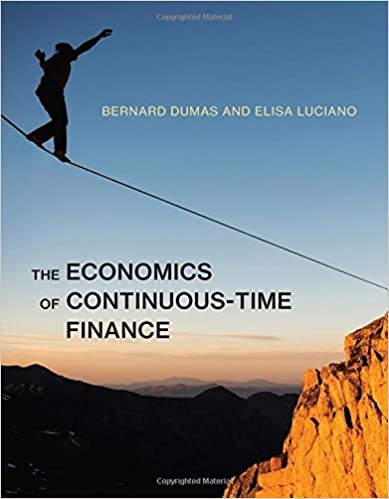
An introduction to economic applications of the theory of continuous-time finance that strikes a balance between mathematical rigor and economic interpretation of financial market regularities.
This book introduces the economic applications of the theory of continuous-time finance, with the goal of enabling the construction of realistic models, particularly those involving incomplete markets. Indeed, most recent applications of continuous-time finance aim to capture the imperfections and dysfunctions of financial markets -- characteristics that became especially apparent during the market turmoil that started in 2008.
The book begins by using the discrete time to illustrate the basic mechanisms and introduce such notions as completeness, redundant pricing, and no arbitrage. It develops the continuous-time analog of those mechanisms and introduces the powerful tools of stochastic calculus. Going beyond other textbooks, the book then focuses on the study of markets in which some form of incompleteness, volatility, heterogeneity, friction, or behavioral subtlety arises. After presenting solutions methods for control problems and related partial differential equations, the text examines portfolio optimization and equilibrium in incomplete markets, interest rate and fixed-income modeling, and stochastic volatility. Finally, it presents models where investors form different beliefs or suffer frictions, form habits, or have recursive utilities, studying the effects not only on optimal portfolio choices but also on equilibrium, or the price of primitive securities. The book strikes a balance between mathematical rigor and the need for economic interpretation of financial market regularities, although with an emphasis on the latter.
Editorial ReviewsReview
This book is a delight. The mathematical structures behind various important research directions are presented in a clear and intelligible way. A highly useful textbook!
(Walter Schachermayer, Full Professor of Mathematics, Vienna University; coauthor of The Mathematics of Arbitrage)This book is a real 'tour de force': twenty-five years after Merton's book on continuous-time Finance, Dumas and Luciano provide a long-awaited update on the continuous time approach to security pricing and portfolio selection in complete and incomplete markets. Covering a wide range of topics, the authors manage to be accessible without sacrificing mathematical rigor and by constantly using economic intuition.
(Jean-Charles Rochet, Professor of Banking, University of Zurich; Visiting Professor, University of Geneva; coauthor of Continuous-Time Models in Corporate Finance, Banking, and Insurance)Dumas and Luciano, two major contributors to financial economics, provide a formal and rigorous yet lucid and intuitive theoretical account of financial markets, with particular emphasis on equilibrium and incomplete markets, smoothly transitioning from discrete to continuous-time models and from complete to incomplete markets. The Economics of Continuous-Time Finance is a thought-provoking and indispensable companion for advanced students and researchers in financial economics.
(George Constantinides, Leo Melamed Professor of Finance, Booth School of Business, The University of Chicago).Product details
- Series: MIT Press
- Hardcover: 640 pages
- Publisher: The MIT Press (October 27, 2017)
- Language: English
- ISBN-10: 0262036541
- ISBN-13: 978-0262036542
 The Economics of Continuous-Tim - Bernard Dumas.pdf
(14.5 MB, 需要: 24 个论坛币)
The Economics of Continuous-Tim - Bernard Dumas.pdf
(14.5 MB, 需要: 24 个论坛币)





 雷达卡
雷达卡








 京公网安备 11010802022788号
京公网安备 11010802022788号







